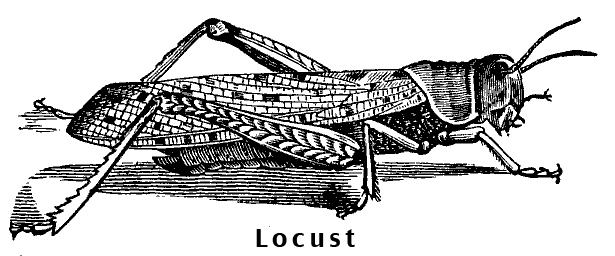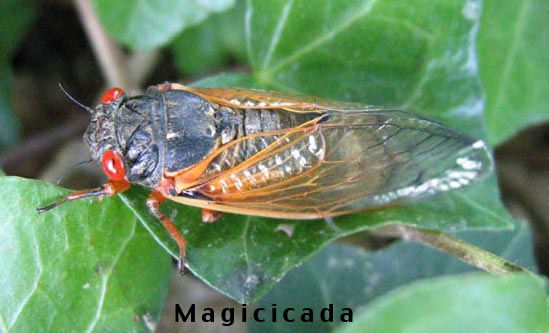Are Cicadas Locusts? The short answer is NO. However, in the U.S.A. we’ve been calling cicadas “locusts” for hundreds of years.
People have seen referring to cicadas, particularly Periodical cicadas, as both flies and “locusts” since the 1600’s, when colonists first documented them.

Gene Kritsky’s book Periodical Cicadas: The Plague and the Puzzle provides a chronology and historical texts of people referring to cicadas as “locusts”. Consider this quote from Pehr Kalm from 1756:
By the Englishmen here they are called Locusts and by the Swedes living here, they have gotten the name Grasshoppers. In Latin, they could be called Cicada.
It makes some sense that Englishmen would call cicadas Locusts, and Swedes would call them Grasshoppers because there was only one species of cicada in both England and Sweden. This cicada, Cicadetta montana montana, call is so high-pitched you need electronic assistance to hear it, so most people were not aware of its existence. So, when Englishmen and women encountered cicadas they likely thought “there are a lot of them, they’re big, I’m afraid they’re going to eat my carrots — these must be LOCUSTS”!
Cicadas are indeed not Locusts, Grasshoppers or Flies.
Take a look that the illustration of a true locust below. You’ll notice the true locusts have HUGE rear legs for hopping, long antennae, and relatively long bodies. True locusts chew the plants they consume, while Magicicadas suck fluids from trees.
Locust:

17-year cicada:

| Characteristic | Locust | Cicada |
|---|---|---|
| Order | Orthoptera | Hemiptera |
| Hind Legs | Giant hind legs for jumping | Hind legs about the same size as other legs; great for climbing and perching. |
| What they eat | Everything green they can find to eat | Xylem sap |
| They’re in your town | All the plants in your town have been stripped bare | Cool UFO movie soundtrack sounds during the day |
For more instances of cicadas being confused with other types of insects, read the article These are not cicada insects!
10 replies on “When is a locust not a locust? When the locust is a cicada.”
Doing a puzzle! Looking for a Six-letter word for cicada that ends in the letters -IX. Starts with the letter S or T!
Many thanks.
The smile that has been soaked in tears is the most brilliant, and the soul that comes out of the confusion is the most sober.
You’re a poet.
Did you make that up, Elizabeth? Or is it a quote? If a quote, you should acknowledge whose. I wld like to use this quote and if its your original poetry, I wld like to make sure to give you credit.
Lovely
If you go to our Sounds page https://www.cicadamania.com/cicadas/cicada-songs-audio-sounds-noise/ there’s cicada sounds to listen too, and then check out the sounds of insects page http://www.musicofnature.com/songsofinsects/iframes/specieslist.html for locust/grasshopper sounds.
Dan lots of fascinating information on here. I live in Alabama and we have here some kind of insect that leaves a full bodied husk laying about. They also make loud cricket type sounds, but I kind of love that sound if its not too many of them too loud. They sound kind of magical to me, idk why. Is this a cicada? Because I hear them every year.
I kind of enjoy the sound they make unless too many of them get too loud. They sound magical. Also, I have always thought the husk they leave behind was called a “dry fly”.. At least thats what we called them when we were kiddos.
My daughter has taught her daughters that these husks are fairy horses that only “come to life” at night. They get so excited when they see them!
Thanks for showing the physical difference in the two – – we’ve been having discussions recently here in Indiana. Please show a link or sound differences in the two, as our locusts have that longer, drawn-out tone (up-down), and the long fade at the end. Very interesting.
-Caroline of Indiana